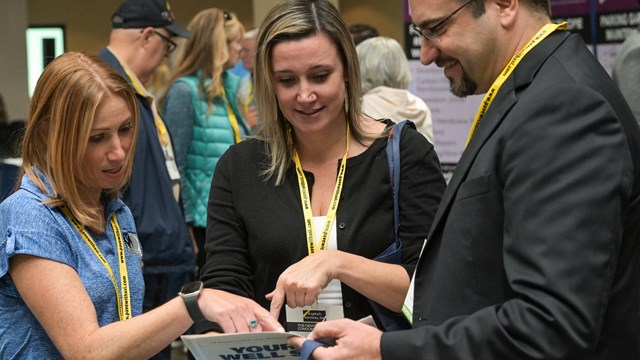Anyone who’s clocked lots of hours at association meetings has a story or two about high passion and heated arguments—but a police detail at an annual meeting? “If someone’s just too disruptive,” reports Henry Goodman of the Dedham, Massachusetts law firm of Goodman, Shapiro & Lombardi, LLC, “police have been called. One association we know, anticipating the attendance of a perennial ‘bad actor,’ hired a police detail in advance to be on site during the meeting.”
Goodman states, “We try to tell people how to keep meetings short and to the point and squelch inappropriate interference …” although he contends that most board members aren’t forceful enough to control “people who want to put forth their own agenda.”
Too often, he says, “As soon as meetings, whether board meetings or unit owner meetings, start, the board chairman lets everyone raise their hands, and they promptly take over the meeting… but that’s wrong. There are certain things the board must do at board meetings, such as make policy decisions, which they cannot delegate to anyone else. At annual meetings, they must get through all the items of business required by their documents first… and then let people talk.
“Often, a ‘gadfly’ in the audience can really drive you crazy. Unfortunately, residents believe they will get some kind of result by talking about their problems in front of other unit owners at the annual meeting,” Goodman notes, but “that’s not how it works. At an annual meeting, people should only be talking about things that are relevant to the entire community.” An individual’s issues should have a place on the agenda of regular board meetings, he adds.
“Robert’s Rules of Order are very cumbersome and unnecessarily complicated,” he points out [see sidebar]. “There’s no requirement that anyone follows Robert’s Rules unless it’s specified in the condo docs, and most docs leave the rules of order to the party conducting the meeting—usually the [board] chairman. I advise boards to just create rules that they can use.”
To keep meetings on track, Goodman insists, “Certain rules should be followed. First of all, everyone who wants to speak should be limited. One minute is sufficient. If someone thinks about what they want to say first… they can get it out in one minute. One minute is actually a long time.”
“The next rule,” he continues, “is that no one should repeat what he has said or what someone else has said. These rules can be applied to any meeting.” At a regular board meeting, which is essentially a business meeting, “time for unit owners to speak should be limited, to maybe 15 minutes total. At a unit owners’ annual meeting, there’s an agenda, and the board has to get through the regular business, all the reports and financials, old and new business. Then the unit owners get their one minute each and everyone who wishes to speak gets a say before someone can speak again.
“Also,” Goodman adds, “even though it’s not required in Massachusetts and since it’s not addressed in most condo docs, we advise boards to keep minutes as an official record of what happened and why, especially because boards always change. In this way, there is a record of what was done and perhaps, why. The agenda covers items dictated in the condo docs, such as treasurer reports, any amendments, other reports, like from the property manager, voting, other business, old and new.” When the agenda is covered first, the reports and presentations often anticipate and answer most questions from unit owners.
Prioritize to Help Move Agenda
To make a board meeting efficient, says Maria Palmieri, CMCA, “You need an agenda in place. You need to be stern and stick to it… and keep people on track.”
Palmieri, vice president at Barkan Management in Boston, continues, “It helps to remind participants that ‘this is a business meeting’—and you definitely need a time limit for the open discussion part of the meeting.” The management team has a role at board meetings to “provide financial reviews, maintenance reports,” she notes, “but you need a strong chairman to facilitate meetings. The goal is to limit the agenda and cover the high-priority items first. We explain to the board that they may need to move items that are not time-sensitive to the next meeting.”
At the annual meeting, she agrees with Attorney Goodman when she says, “I like to see any Q & A from unit owners at the end of the business meeting, after all the essential reports on condo business from the past year have been addressed. After that, any open discussion must have a time limit.
“Some boards let unit owners ask questions during the presentations and reports,” Palmieri continues, “and that just creates a time problem. The business portion of the agenda should be considered a ‘closed’ meeting, with all comments or questions reserved until afterwards.”
She contends that the management team can support whoever is facilitating the meeting if need be, and without stepping on toes. “If the chair is not getting the job done, management can help get [whoever’s in charge] get focused. Sometimes people talk at the same time, and we can jump in and suggest, ‘we need to finish this one thing before we move on to something else.’ We can give the chair some help, in getting the topic back. This should be taken as support rather than criticism [of the chairman’s job]. For this, you need a level of trust between the board members and the managers. The board should know where you’re coming from,” she says.
“When dealing with unit owners who take over a meeting and won’t stop talking, you have to make it clear that you are hearing what they are saying. You have to listen. Then you might tell them, ‘we hear what you’re saying and we will take it under advisement… and we will get back to you.’ People just want to be heard.”
Support from the Sidelines
Finding strategies to help move the meeting along while being sensitive to the chairman’s role is a real skill, according to Deborah Jones, president of American Properties Team of Woburn, Massachusetts. “Management staff can really help the board or chairman in controlling a meeting; the challenge is doing it without insulting the person whose job it is [to facilitate the meeting].” She suggests a proactive approach when there is potential for controversy, differing opinions or lengthy discussion at an upcoming meeting. “For example, I have one association… at their annual meeting they have it printed right on the agenda that anyone speaking is limited to three minutes.”
“The management staff can get together ahead of time. Working together with the chair--or whoever is moderator—we can figure out a strategy for defusing a potentially-heated meeting and dealing with opposing factions.”
Feathers get ruffled easily when passions run high. People in a heated argument don’t appreciate a facilitator’s efforts to quiet things down and get the meeting back on course—they immediately feel defensive, or disrespected. “There really is an art to interrupting someone gracefully,” says Jones.
She describes how to “find a way to bring things around” when discussion gets off-topic. “An effective way to turn the direction of the meeting is to ask a question. For example, ‘I wonder if we have enough information to get a vote on this topic’ will get a better response than a statement like, ‘It’s time to change topics.’ And you can always ask, ‘I wonder if it’s a good time to take a break… and step back to consider [options].’ The phrase ‘I wonder if…?’ is a good way to introduce a suggestion.” It’s a non-threatening, low-key way to interrupt an argument and re-direct the discussion.
“By asking a question,” Jones continues, “anyone can interject and make a suggestion, besides the chairman or moderator.” That’s where some teamwork with the board members and managers can come into play. “For the management team,” she notes, “it’s all about supporting the chair or meeting facilitator from behind the scenes, and not out front. After all, it’s their meeting. Sometimes boards have asked us to facilitate, and we’ll do it if requested, but it’s really not our role. There could be a danger if management is perceived as ‘running the meeting’.”
And what about the occasional long-winded board member or chair? Sometimes it’s the people running the meeting who run overtime when they have the floor. Jones says, “If it’s the board chairman who’s monopolizing… you may need to enlist other board members. You can take someone aside and say, ‘I see that you get quiet when the chairman takes over the floor, and you seem to have something to say… How can I help you? I know that so and so [board member] is really passionate about this topic, and you may have another, equally important point. I want to help make it a comfortable place for everyone to express their own opinion.’ Remember that,” she continues, “in any kind of meeting, anyone participating has the opportunity to move the meeting along—hopefully in a civilized and courteous way.”
Marie N. Auger is a Massachusetts freelance writer and a frequent contributor to New England Condominium.







Leave a Comment